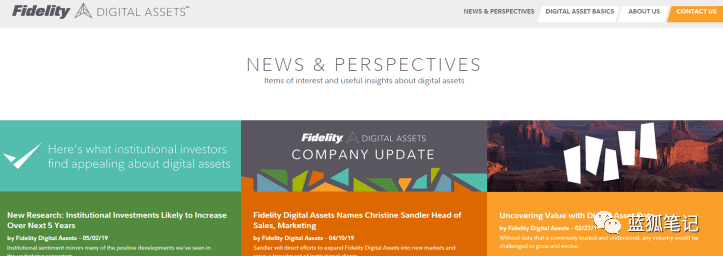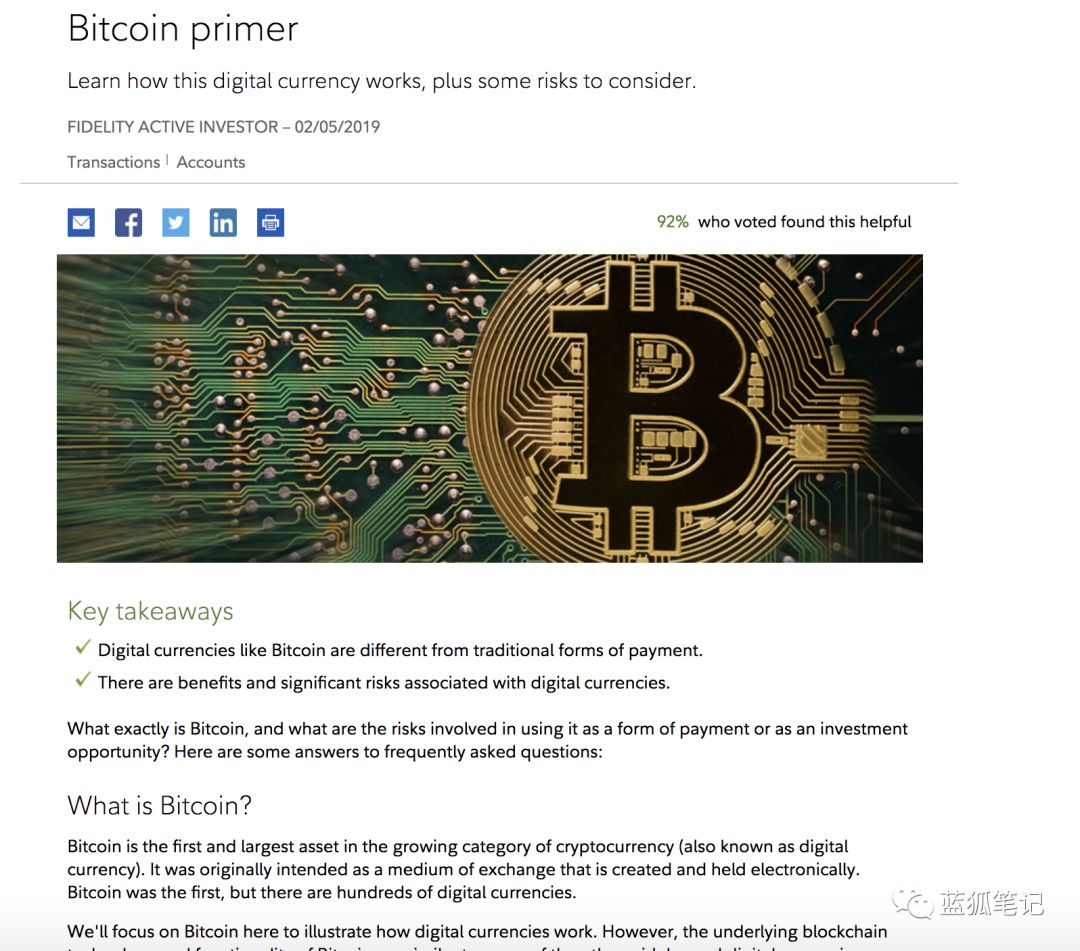Once Wall Street begins to tell stories, everything about cryptocurrencies will change.
Wall Street comes to the encrypted world
Fidelity is the first traditional Wall Street institution to create a cryptocurrency platform for institutional investors. TD Ameritrade, E-trade and Bakkt are all planning to follow suit. There are rumors that Nasdaq is also planning to enter this field soon (it has provided institutional investors with a cryptographic index and data platform, as well as a securities-based token trading platform).
If you think this means that a lot of money is about to flow into the cryptocurrency market, you might be right. But I think we should be wary of the saying that “institutional investors will push prices up to heaven”.
This may happen, maybe not. But there is a bigger story you need to pay attention to.
- Interpretation: The central bank announced the acceleration of legal digital currency research and development, these four points must be concerned
- Technology Perspectives | How to solve the problems and challenges of all current cross-chain solutions?
- July blockchain private placement financing monthly report: the amount increased by 12.6%, the Chinese market began to heat up
The person who makes money in the profession is coming.
Take a look at Fidelity's login page for cryptocurrency services:
 Screenshot of the page of Fidelity cryptocurrency section on June 26, 2019
Screenshot of the page of Fidelity cryptocurrency section on June 26, 2019
What did you notice?
There is no mention of bitcoin, cryptocurrency or price information. The clean lines and soft colors make the page look smoother, using words like "news" and "points of view", as well as fact-based, data-driven views.
This is a typical professional marketing content. This is what I learned in political and business communication, and the skills and knowledge I use in my daily work.
Read this "Getting started with Bitcoin":
 Excerpt from Fidelity's bitcoin primer
Excerpt from Fidelity's bitcoin primer
What did you notice?
This is an elaboration of an emerging asset class with potentially huge gains, with appropriate wording and neutrality. (Blue Fox Note: More content can be read on the Fidelity website)
Compare the content of Bitcoin on Reddit:
 Reddit page on Bitcoin topics
Reddit page on Bitcoin topics
If you are young and conscious, you may not think that there is any difference. Compared to Fidelity, you even prefer the content on Reddit.
But Wall Street doesn't care what you think. It cares about your parents, grandparents, investment funds, and portfolio managers—those who are richer than you (even more concerned about you than you). (Blue Fox Notes: This is especially true for rich people, " The Myth of Millionaires and Bitcoins ")
These people won't get advice from Reddit.
Suit, not litigation
As a generation growing up on the Internet, you may think that reading the messy personal content on the Internet is no problem. But in reality these are unprofessional, funny, informal, and casual. The content usually on bulletin boards or blogs is filled with advertisements, links, and images.
The money on Wall Street is not from the Internet generation. The average age of millionaires is 61, the average age of listed company shareholders is 56, and the average age of portfolio managers is 49.
What's more, these people don't want to see the messy personal content they get from random blogs and bizarre Internet characters. They need professional advice from experienced experts with experience and perspectives, as well as successful experiences.
They have money and obligations. Individual investors are usually just to pay for medical expenses and to increase their wealth for their children and grandchildren (and possibly their elderly parents who need care). Pensions, endowments, and investment funds often have systems that prevent funds from being invested in any type of venture.
Few people buy speculative assets like Bitcoin.
As a result, Wall Street can't make much money from providing cryptocurrency-related services to these people (even if John McAfee announces Bitcoin will reach $1 million by the end of 2020).
Yes, Wall Street can charge some fees and commissions from small investors or funds who want to buy a bit of cryptocurrency, but this is not enough to fund large-scale security, marketing, operations and compliance investments. It is necessary to make cryptocurrency into the public eye.
unless…
Wall Street can change people's perceptions
From a purely investment perspective, Bitcoin has the nature of gold, oil and many other commodities – that is, prices fluctuate sharply in the short term and have no correlation with the stock or bond markets.
Because of this, most portfolios involve some speculative assets. In fact, if you believe in modern portfolio theory (the one that won the Nobel Prize), you must have some speculative assets. That's why Yale, Harvard, MIT, some pensions, and the Rockefeller family have included some cryptocurrency assets in their portfolios.
The speculative nature and volatility of Bitcoin are acceptable.
If the public thinks Bitcoin is a fake, useless network currency, then for them, this investment asset is unacceptable.
A 60-minute clip won't change this view. But what if it is a well-known Wall Street brand with years of marketing and communication experience?
Probably.
And just right, Wall Street is very good at doing this.
Win the hearts
From Wall Street to the mainstream society: one day will be you
Fifty years ago, stocks were considered venture capital, basically a tool for the rich to gamble.
Then, Wall Street created mutual funds, diversified portfolios, and tax-avoiding investment accounts. Stocks become safe, long-term investment vehicles.
Now, many people invest their pensions in the stock market. Pensions also invest a large portion of their funds in stocks, and even some banks and annuity companies hold stocks as reserves.
Wall Street changed the story.
Thirty years ago, commodities were considered a playground for traders and speculators and were not suitable as a target for a legitimate portfolio.
Then, Wall Street created the ETF as an easy way to target the exposure of commodity prices. Commodities become "alternative assets", and when prices rise, you can sell them with the click of a mouse.
Commodity ETFs are now almost a part of every portfolio. It used to be unimaginable, but now it has become the standard.
Wall Street changed the story.
Ten years ago, the world economy collapsed, mainly because Wall Street invested trillions of dollars in venture capital that they considered safe. Protests and demonstrations broke out across the country, and the US government had to spend $5 trillion to rescue banks and investment institutions to prevent the collapse of the financial system.
Wall Street then earned profits from a bull market that lasted for more than a decade (thanks to a $5 trillion investment).
Now everyone is proud of the strong stock market, well-capitalized banks and fast-growing financial companies. At present, one major political party advocates reducing supervision and restrictions on Wall Street, while another political party is reluctantly (quietly) maintained.
Wall Street changed the story.
Wash and copy in cryptocurrency
Once Wall Street is involved in cryptocurrencies, they will say, “Hey, remember 2017? The market is full of scams and fraud. We came in and cleaned this place. It’s safe now. Buy Bitcoin (but from us) Buying instead of buying from Coinbase, you can't trust them).
Wall Street will do this because it needs to do so. This is the only way for cryptocurrency investors to get the money they need to develop products and services.
If this seems like a hypothesis, then please review Fidelity's introduction to cryptocurrency. Now look at the websites of the cryptocurrency businesses Bakkt, Erisx and Circle (all subsidiaries of Wall Street).
Smooth, simple, elegant, well-worded, and encrypted friendly.
Wall Street is planting.
Why do you need to care about this?
Wall Street has huge funds and power. Once it enters the cryptocurrency market, it may use these funds and powers to influence marketing, lobbying, and networking systems.
At that time, everything will change.
Maybe it will force you to use your "authorized entity" to hold your cryptocurrency, rather than letting you put your cryptocurrency in your wallet. The Authorized Entity must meet certain requirements that only Wall Street firms can meet. After all, we can't let Bitcoin fall into the hands of criminals and terrorists, right?
Or it may lobby the government to allow cryptocurrencies to be mixed with other assets. This is common in bill assets, which has created a new financial product on Wall Street, a new way to make money, but it will pose a huge risk to the cryptocurrency market.
Perhaps Wall Street will allow the US government to exercise separate control over airdrops, ICO, STO, IEO, and other activities that generate new cryptocurrencies? Perhaps it would even prohibit ordinary people from participating in these issuance activities, just as it prohibits ordinary Americans from entering the private equity market.
Or maybe Wall Street will try to control access to cryptocurrencies, just as telecom companies use to control access to the Internet in the name of promoting innovation. Imagine the new law, is Bakkt or Fidelity your "cryptocurrency service provider"?
Wall Street firms may acquire all small cryptocurrency exchanges and managed wallet providers, and integrate their wallets into new payment networks while closing the light wallet. The private key no longer exists.
What happens when Bakkt builds a node on a lightning network?
Wall Street says people listen
Cryptographic currency amplifier?
You may hate Wall Street, but you can't deny its influence. Your mother will never open a Coinbase account, but she will let her financial advisor buy a $100 bitcoin ETF, "just in case."
Once people start trusting Wall Street with their cryptocurrencies, Wall Street will try to use their trust to make money. Then they look for ways to maintain and strengthen their power from people's trust.
They did just that, I witnessed again and again. In fact, you are also.
Frankly, we don't know what will happen. After working on Capitol Hill, I know that behind every major special interest, there is another major special interest trying to stop it from thinking. Maybe Wall Street is still a marginal participant in the cryptocurrency market after being blocked?
Maybe, but I am deeply skeptical about it.
Wall Street has a loud voice, squadrons of lobbyists and a wide range of advocates around the world. It knows how to tell a fascinating story and has all the money needed to buy advertising and active PR (according to marketing industry data, an estimated $2 billion).
Now, it has another way to save money from your pocket. are you ready?
——
Risk Warning: All articles in Blue Fox Notes do not constitute investment recommendations . Investment is risky . Investment should consider individual risk tolerance . It is recommended to conduct in-depth inspections of the project and carefully make your own investment decisions.
We will continue to update Blocking; if you have any questions or suggestions, please contact us!
Was this article helpful?
93 out of 132 found this helpful
Related articles
- BTC reeling steadily, mainstream currency will usher in opportunities
- Policy intensive, US digital currency regulation enters a new era
- The miners' giants are listed: the road to transformation is long and long
- In line with the Swiss Encrypted Valley, Busan became a “unregulated” area for the development of the Korean blockchain
- Hot money has not flowed into the cryptocurrency market, and it will take time for the runaway
- Count all bitcoin blockchain movies before 2020! Which classics accompany you through the cold winter?
- Interpretation of the market | LTC production price rules can be applied to the BTC?






